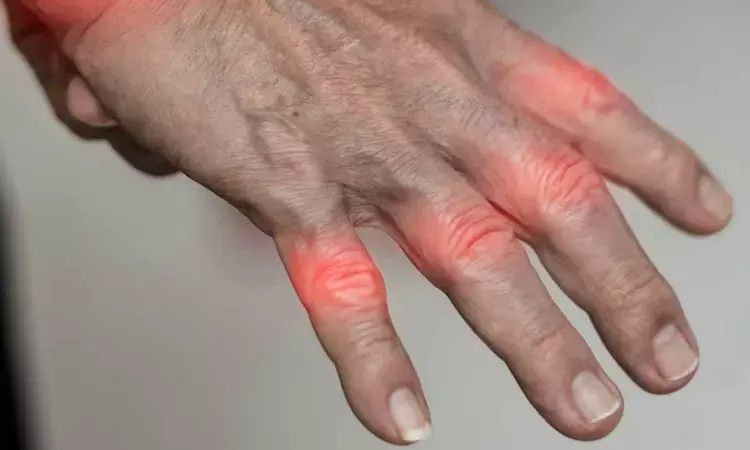- Home
- Medical news & Guidelines
- Anesthesiology
- Cardiology and CTVS
- Critical Care
- Dentistry
- Dermatology
- Diabetes and Endocrinology
- ENT
- Gastroenterology
- Medicine
- Nephrology
- Neurology
- Obstretics-Gynaecology
- Oncology
- Ophthalmology
- Orthopaedics
- Pediatrics-Neonatology
- Psychiatry
- Pulmonology
- Radiology
- Surgery
- Urology
- Laboratory Medicine
- Diet
- Nursing
- Paramedical
- Physiotherapy
- Health news
- Fact Check
- Bone Health Fact Check
- Brain Health Fact Check
- Cancer Related Fact Check
- Child Care Fact Check
- Dental and oral health fact check
- Diabetes and metabolic health fact check
- Diet and Nutrition Fact Check
- Eye and ENT Care Fact Check
- Fitness fact check
- Gut health fact check
- Heart health fact check
- Kidney health fact check
- Medical education fact check
- Men's health fact check
- Respiratory fact check
- Skin and hair care fact check
- Vaccine and Immunization fact check
- Women's health fact check
- AYUSH
- State News
- Andaman and Nicobar Islands
- Andhra Pradesh
- Arunachal Pradesh
- Assam
- Bihar
- Chandigarh
- Chattisgarh
- Dadra and Nagar Haveli
- Daman and Diu
- Delhi
- Goa
- Gujarat
- Haryana
- Himachal Pradesh
- Jammu & Kashmir
- Jharkhand
- Karnataka
- Kerala
- Ladakh
- Lakshadweep
- Madhya Pradesh
- Maharashtra
- Manipur
- Meghalaya
- Mizoram
- Nagaland
- Odisha
- Puducherry
- Punjab
- Rajasthan
- Sikkim
- Tamil Nadu
- Telangana
- Tripura
- Uttar Pradesh
- Uttrakhand
- West Bengal
- Medical Education
- Industry
Febuxostat Linked to Higher Liver Toxicity Than Benzbromarone in Gout Patients: Study

Researchers have found in a recent study that febuxostat carries a significantly greater risk of liver function disturbances compared to benzbromarone in patients with gout. Despite common clinical hesitation to use benzbromarone, the findings suggest it may have lower hepatotoxicity than febuxostat.
The objective of this study was to evaluate and compare the risk of hepatotoxicity associated with the use of febuxostat and benzbromarone in patients with gout. New users of febuxostat or benzbromarone with monitoring of liver function at least three times in a year after initiation of the study drugs were identified from an electronic medical record database.
Propensity score matching (PSM) was performed between the two groups 1:1 to match for age, sex, and pre-treatment alanine aminotransferase (ALT) and aspartate aminotransferase (AST). Kaplan-Meier analysis was used to estimate the probability of hepatotoxicity (defined as ALT or AST >3x upper limit of normal). Hazard ratios (HR) and 95% confidence intervals (CI) were calculated using Cox regression. Subgroup analysis was performed based on age, body mass index, and comorbidities.
Results: 2,338 patients with gout were eligible. A total of 37% experienced Common Terminology Criteria for Adverse Events (CTCAE) v5 grade 1-3 AST/ALT abnormality. After PSM, 488 febuxostat users were matched with 488 receiving benzbromarone with a mean follow-up of 1.20 years.
The incidence of hepatotoxicity was 39.6 and 16.8 per 1,000 person-years for febuxostat users and benzbromarone users, respectively. Febuxostat use was associated with a significantly greater risk of hepatotoxicity than benzbromarone (adjusted HR 2.75, 95% CI 1.28-5.91), especially in patients with elevated transaminases at baseline.
Findings did not differ according to pre-specified subgroups. Febuxostat use is associated with a significantly greater risk of mild to moderate perturbation of liver function compared to benzbromarone in patients with gout.
Reference:
Sun, W., Cui, L., Terkeltaub, R., Chen, Y., Li, X., Cheng, X., Liu, T., Dalbeth, N. and Li, C. (2025), Risk of hepatotoxicity in patients with gout treated with febuxostat or benzbromarone: a propensity score-matched cohort study. Arthritis Care Res. Accepted Author Manuscript. https://doi.org/10.1002/acr.25547
Dr. Shravani Dali has completed her BDS from Pravara institute of medical sciences, loni. Following which she extensively worked in the healthcare sector for 2+ years. She has been actively involved in writing blogs in field of health and wellness. Currently she is pursuing her Masters of public health-health administration from Tata institute of social sciences. She can be contacted at editorial@medicaldialogues.in.
Dr Kamal Kant Kohli-MBBS, DTCD- a chest specialist with more than 30 years of practice and a flair for writing clinical articles, Dr Kamal Kant Kohli joined Medical Dialogues as a Chief Editor of Medical News. Besides writing articles, as an editor, he proofreads and verifies all the medical content published on Medical Dialogues including those coming from journals, studies,medical conferences,guidelines etc. Email: drkohli@medicaldialogues.in. Contact no. 011-43720751


